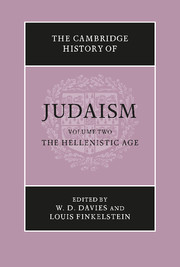Book contents
- Frontmatter
- 1 The archeology of Hellenistic Palestine
- 2 The political and social History of Palestine from Alexander to Antiochus III (333–187 B.C.E.)
- 3 Hebrew, Aramaic and Greek in the Hellenistic age
- 4 The Diaspora in the Hellenistic age
- 5 The interpenetration of Judaism and Hellenism in the pre-Maccabean period
- 6 The men of the Great Synagogue (circa 400–170 .b.c.e.)
- 7 Pharisaic leadership after the Great Synagogue (170 B.C.E.–135 C.E.)
- 8 Antiochus IV
- 9 The Hasmonean revolt and the Hasmonean dynasty
- 10 Jewish literature in Hebrew and Aramaic in the Greek era
- 11 Jewish–Greek literature of the Greek period
- 12 The Apocrypha and Pseudepigrapha of the Hellenistic period
- 13 The book of Daniel
- 14 The matrix of apocalyptic
- 15 The Septuagint and its Hebrew text
- 16 The Targumim
- 17 The Samaritans
- 18 The growth of anti-Judaism or the Greek attitude towards the Jews
- Bibliographies
- Chronological table
- Index
- References
16 - The Targumim
Published online by Cambridge University Press: 28 March 2008
- Frontmatter
- 1 The archeology of Hellenistic Palestine
- 2 The political and social History of Palestine from Alexander to Antiochus III (333–187 B.C.E.)
- 3 Hebrew, Aramaic and Greek in the Hellenistic age
- 4 The Diaspora in the Hellenistic age
- 5 The interpenetration of Judaism and Hellenism in the pre-Maccabean period
- 6 The men of the Great Synagogue (circa 400–170 .b.c.e.)
- 7 Pharisaic leadership after the Great Synagogue (170 B.C.E.–135 C.E.)
- 8 Antiochus IV
- 9 The Hasmonean revolt and the Hasmonean dynasty
- 10 Jewish literature in Hebrew and Aramaic in the Greek era
- 11 Jewish–Greek literature of the Greek period
- 12 The Apocrypha and Pseudepigrapha of the Hellenistic period
- 13 The book of Daniel
- 14 The matrix of apocalyptic
- 15 The Septuagint and its Hebrew text
- 16 The Targumim
- 17 The Samaritans
- 18 The growth of anti-Judaism or the Greek attitude towards the Jews
- Bibliographies
- Chronological table
- Index
- References
Summary
In the Jewish world of the Diaspora (and also in Palestine), historical and linguistic conditions had, as early as the third century b.c.e., led to the translation of the Bible into Greek. Similar reasons explain the origin of Targums. The problems posed in this connection, however, are considerably greater and more complex than for the LXX.
The word targum signifies ‘translation’ and derives from the verb tirgem meaning ‘to translate’, ‘to explain’, or ‘to read out’ (compare Ezra 4:7); it is a denominative of turgeman (= interpreter) to which an Akkadian origin is generally attributed. In rabbinic usage tirgem is employed to designate a version translated from the Hebrew into any language whatever (y. Kidd i.59a;y. Meg. 1.71c), but targum is used only for a translation of the Bible into Aramaic or for the Aramaic passages of the Old Testament (Yad. 4.5). The professional Synagogue translator was called turgeman or meturgeman (Meg. 4.4). As a literary genre Targum is distinct from Midrash in that it is primarily a translation and not a commentary and, in its strictest definition, a translation intended for the liturgy of the Synagogue.
We now possess Targums of all the books of the Bible, with the exception of Ezra-Nehemiah and Daniel. Until recently the most commonly accepted opinion was that these were late productions, distributed between the fourth and fifth centuries c.e. and the Middle Ages. It was conceded that the institution of Targum itself was pre-Christian; but because of the prohibition upon putting into writing the oral tradition, the texts themselves could not have been anterior to the first writings of rabbinic Judaism (about 200 c.e.).
- Type
- Chapter
- Information
- The Cambridge History of Judaism , pp. 563 - 590Publisher: Cambridge University PressPrint publication year: 1990

